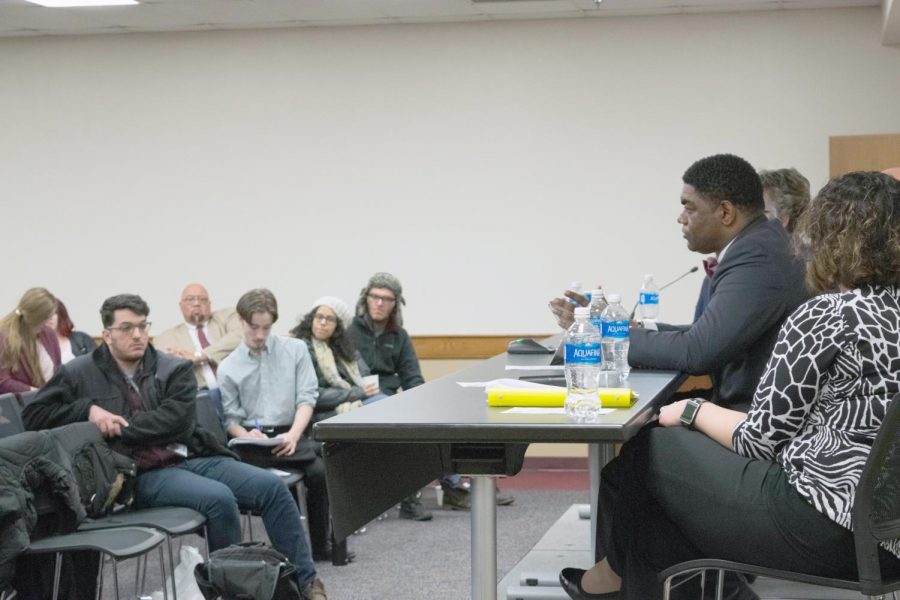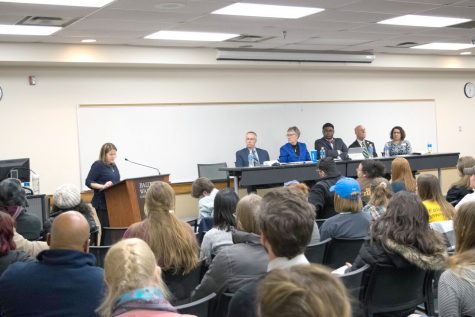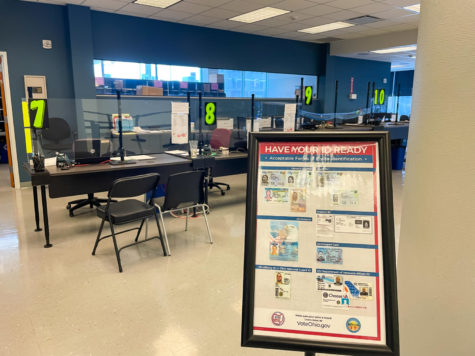Students’ choice, staff awareness of policy can impact reporting of sexual misconduct
BW seeks to better articulate mandatory reporting policy
CJ Harkness, right, Baldwin Wallace’s Title IX coordinator, speaks during a Jan. 17 campus forum addressing issues and policies related to sexual misconduct.
Despite the total being more than he has ever received in a single semester, Harkness said he thinks it is probable that more than 15 instances of sexual misconduct occurred last semester.
From social media to campus forums, conversations on campus regarding BW’s handling of sexual misconduct issues have been ongoing this semester. Moreover, a task force created to review current BW policies and procedures has begun its work to produce recommendations for the school by the end of the semester, with regular email updates expected.
As the campus continues to more openly discuss matters of sexual misconduct and the Title IX process, Harkness said there are multiple factors that may contribute to a low number of reports.
In particular, two causes include a misunderstanding of reporting policies and procedures as well as the personal decision of many students to refrain from reporting their incidents.
On one side of the coin, Harkness emphasized that the student is in control over the extent to which the university will become involved in his or her case and some students who have experienced sexual misconduct choose not to make a report and proceed with the Title IX process.
“Coming forward does not force you, or force your hand and your participation, in any university proceedings,” said Harkness. “We encourage people to go forward, but you won’t get in trouble for not coming forward.”
A student can choose to make a report to the university, to law enforcement, or to both, said Harkness.
A student can choose to make a report without requesting for any action to be taken, which Harkness said is “a lot more frequent than most people would realize.” Noting that students might be reluctant to file a report if underage drinking or substance abuse was involved, Harkness also said that the school will not file alcohol or other conduct charges against a student making a sexual misconduct complaint.
If the student wishes for action to be taken, he or she can request a restriction of contact, which does not require an investigation or any sort of “threshold or burden of proof.” If a student wishes to proceed with university sanctions against his or her harasser or assailant, depending on the response of the accused individual, the university will go forward with full investigation of the incident.
While Harkness says he presents all of these options to students who come forward with complaints, there is little he can do for students whose complaints didn’t reach the Title IX office.
Some concerns fail to reach the Title IX office because of an imperfect implementation of BW’s mandatory reporting policy, said Harkness. Under this rule, all BW employees—with the exception of counseling staff, health care staff, and clergy—are obligated to report any information they receive about potential incidents of sexual misconduct to the Title IX office.
Harkness said that “part of the challenge” in addressing sexual misconduct incidents reported to such employees is that many of the school’s mandated reporters are unaware or unsure of their responsibilities. To address this lack of clarity, Harkness said his office will be working “diligently” to articulate “a more clear understanding to all of our employees that mandatory means mandatory.”
Mandated reporters must report any information disclosed to them that might be an instance of sexual misconduct even if it goes against the wishes of the student, Harkness said. Such employees also must “report up” to the Title IX office regardless of whether or not they believe the case is provable, relevant, or serious enough to proceed.
“We have to be sure that all of our employees are aware that they are not charged with discernment as to whether or not a case has merit or should be reported,” said Harkness. “If it has any element, any inkling, any sort of context that might be discriminatory—and specific to this conversation, any form of sexual misconduct—they should report that disclosure immediately.”
In a case where the Title IX office receives information about an incident from a mandated reporter, Harkness said he will follow up with the victim. That individual would have the same options he would have if he or she personally came forward, and would not be forced to discuss or proceed with anything against his wishes.
“After being sure that I had done my due diligence in trying to make sure I extended your rights and resources to you—or extended the opportunity for us to discuss, whatever may have been the case—I’m going to leave you alone,” Harkness said.
While some sexual misconduct incidents are not addressed by the university because a report was made but failed to reach the Title IX office, others are not addressed because the student chose not to make a report. Tessa Greene, campus outreach specialist through CRCC, said the decision to report is “very personal” for a survivor.
There may be many “barriers” that may prevent sexual misconduct survivors from making a report, she said. Survivors may feel “shame and embarrassment” about their experience, and might feel very “uncomfortable” discussing what happened to them, said Greene, or they might fear “retaliation” from either the “perpetrator of the violence” or from “social groups on campus.” They also might worry that they will be blamed for the actions of their harasser or assailant or that nobody will believe them if they come forward.
A barrier that “encompasses” several other issues is confidentiality, said Greene.
“A lot of times, confidentiality is really crucial to survivors because they have already endured this violence,” said Greene. “To have to share [their experience] with other folks, to not know exactly who may or may not know about their experience, that can be really daunting and can be a huge barrier.”
The importance of confidentiality for a survivor of sexual misconduct causes some faculty members to take issue with BW’s mandatory reporting policy. Harkness said that there is a debate as to whether or not faculty members should be mandated reporters because some believe that it “encroaches on the natural faculty-student engagement or relationship.”
One BW faculty member, who wished to remain anonymous so he could speak candidly, said that he has “mixed feelings” about the mandatory reporting rule. While he says he understands the benefits of mandatory reporting, he is uncomfortable with the idea of breaking a student’s confidence.
“[The rule] leads students to feel that they could never be candid,” he said. “They might want advice from a professor, in my case, but they don’t dare go to that professor because they know that professor has just basically been turned into a walking tape-recorder who will go right to the administration with it, because he or she is required to. And I could see that that might not be good for the sake of the student.”
For her part, Greene says she believes it is important that mandated reporters understand their roles and communicate to their students their responsibilities. She said that while there is “no perfect art” to that, it is “always important to be as upfront and honest as possible with mandatory reporting obligations.” Noting that sexual violence is “a crime about power and control,” Greene said that it is important that a survivor always has “voice and choice in what’s next for them.”
Harkness recognizes the need for survivors to have control over their situations, but he said that it can be difficult to balance that need with a consistent institutional response.
“One of the most difficult pieces of doing this work is maintaining a standard of returning a sense of control back to someone who’s been violated while, at the same time, trying to do the best you can to respond effectively and consistently and complaints,” said Harkness.
Harkness said the question of who should be mandatory reporters at BW might be “revisited” in the future, and that he would be “interested in hearing from the BW community” if they believe the mandatory reporting rule needs to be changed. For now, however, he believes that it is important to clarify everyone’s roles in the current reporting process so it can be implemented effectively.
“Mandatory reporting is not up for interpretation, at least not right now,” said Harkness. “We can have a broader conversation about whether or not we want to change it, but as we stand today, let’s be very clear.”
The Exponent is looking for financial contributions to support our staff and our newsroom in producing high-quality, well-reported and accurate journalism. Thank you for taking the time to consider supporting our student journalists.
















































